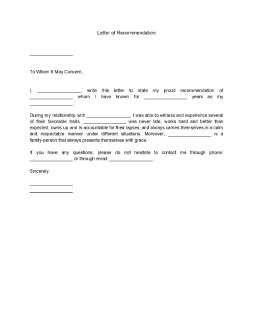- Eviction Notice Forms
- Power of Attorney Forms Forms
- Bill of Sale (Purchase Agreement) Forms
- Lease Agreement Forms
- Rental Application Forms
- Living Will Forms Forms
- Recommendation Letters Forms
- Resignation Letters Forms
- Release of Liability Agreement Forms
- Promissory Note Forms
- LLC Operating Agreement Forms
- Deed of Sale Forms
- Consent Form Forms
- Support Affidavit Forms
- Paternity Affidavit Forms
- Marital Affidavit Forms
- Financial Affidavit Forms
- Residential Affidavit Forms
- Affidavit of Identity Forms
- Affidavit of Title Forms
- Employment Affidavit Forms
- Affidavit of Loss Forms
- Gift Affidavit Forms
- Small Estate Affidavit Forms
- Service Affidavit Forms
- Heirship Affidavit Forms
- Survivorship Affidavit Forms
- Desistance Affidavit Forms
- Discrepancy Affidavit Forms
- Career Assessment - 16+ Examples, Format, Tips, Pdf Forms
- Undertaking Affidavit Forms
- General Affidavit Forms
- Affidavit of Death Forms
Recommendation Letters
Whether it is for employment or a graduate program’s admission, a reference letter can help up the applicant’s chance. Recommendations are suggestions or proposals for the best courses of action. Thus, recommendation letters are essentially documents that bear positive content serving as valid seals of approval. If you are asked by someone to write a recommendation letter, make time to think about it. The content of this article can help you make your final decision. Read More

By Type
- Teacher Recommendation Letter
- Thank You Letter for Recommendation
- Tenant (Landlord) Recommendation Letter
- Promotion Recommendation Letter
- Personal Recommendation Letter (For a Friend)
- College Recommendation Letter
- Professional Recommendation Letter
- Student Recommendation Letter
- Character Reference for Immigration Recommendation Letter
- Medical School Recommendation Letter
- Employer Recommendation Letter
- Law School Recommendation Letter
- Scholarship Recommendation Letter
- Military Recommendation Letter
- Eagle Scout Recommendation Letter
- Graduate School Letter of Recommendation
- Sorority Recommendation Letter
Whether it is for employment or a graduate program’s admission, a reference letter can help up the applicant’s chance. Recommendations are suggestions or proposals for the best courses of action. Thus, recommendation letters are essentially documents that bear positive content serving as valid seals of approval. If you are asked by someone to write a recommendation letter, make time to think about it. The content of this article can help you make your final decision.
What Is a Recommendation Letter?
Recommendation letters are staple requirements when one chooses to enroll for higher studies, placing an immigration appeal through a character reference, or when applying for a new position. Primarily, the document contains praises and commendations for the applicant or the person needing the recommendation. In most cases, the recommendation letter can make or break the individual’s appeal or application because the details in these documents can verify the claims of the applicant. It can also provide supporting information that you may not find in the other documents required by the applicant.
How Do You Write a Recommendation Letter?
You might think that writing an employer recommendation letter is simple, but in reality, it can be confusing and draining. One might ask why it can be exhausting. This can be an ordeal, especially for professors who are asked by former students to write for their postgraduate admissions process. If you have questions on what and what not to write in a compelling recommendation letter, here are a few tips on how to write an effective recommendation letter.
1. Start Strong
Starting a personal recommendation letter requires you to be direct to the point. Any recommendation letter, regardless of its purpose, needs to be straightforward. As a formal business letter, both the choice of vocabulary and formatting must follow the preferred professional guidelines. On another note, starting strongly also means including a brief yet comprehensive self-introduction. A short introduction can introduce your credentials that can help with the case of the applicant. Most admissions teams and immigration judges also look into the character of the writer of the recommendation letter to weigh the bearing of the recommendation.
2. State a Firm Support
The focal point of any recommendation letter is also its strongest point. After your introduction, present the reasons why you recommend the person right away. These reasons take the form of the commendable traits and abilities that will help them land the job or get through the application. As much as you can list down several qualities, anecdotes of personal experiences with the applicant can create a clearer picture of who the applicant is. Short narratives are also more believable and do a better job of convincing any admissions committee or an immigration judge.
3. Include Accurate Contact Information
A recommendation letter needs to be straight to the point. When you are done listing down why the applicant deserves your recommendation, end the letter by stating that your lines are open for further questions and clarifications. Thus, it is necessary to include your contact details, which commonly are your mobile number, email address, and telephone number if available. Also, you can consist of a set time frame to indicate when your lines are open, especially when you have a tight schedule during the day.
4. Maintain a Professional Tone
Since the primary goal of a recommendation letter is to persuade or sway the reader to give a favorable response to the applicant, the document can have an emotional undertone because of its appeal to emotions. However, you must be wary of your writing tone throughout the message. A recommendation letter must maintain a formal tone because you mostly use it in professional situations and processes, such as in employment and immigration application. It can also stand in court.
5. Follow a Formal Format
As stated above, recommendation letters are required for several formal processes. Thus, it must also follow guidelines for writing a formal business letter. The format includes the alignment of the letter, as well as the choice of language. Most importantly, it must follow the blocks or segments of a business letter—from the date until the writer’s salutation.
Frequently Asked Questions
How many recommendation letters should be submitted?
The number of letters required varies according to its purpose. For school admissions, the maximum number of recommendation letters asked is three. These three documents will each go to a particular department, such as the guidance office, admissions team, and the office of the college, for college or scholarship recommendation letters. As for its other uses, you only need one copy of the letter, especially when two or more people have to write a recommendation for the applicant.
Can I submit extra recommendation letters?
Sending extra letters will neither be beneficial nor detrimental to the process you are engaging in. Adding more letters will not add more weight to your application. So, you may submit extra letters, but it is not necessary and not advisable.
Can I read my recommendation letter before sending them?
It is common practice that the writer of the letter will seal the recommendation shut before giving it to the applicant. You often see this process in school admissions, immigration applications, and its use in court. The applicant shouldn’t read the contents of the letter. But, if the writer willfully lets the applicant read and know the contents of the letter, they can choose to do so.
Who are the best people to write your recommendation letters?
The best people to ask recommendation letters from are those who have a clear objective view of you, your skills, and abilities. Typically, they are the people you have worked with inside and outside a professional set-up. Teachers, supervisors, organization leaders are great choices in asking for a recommendation.
Is it wise to ask my family members to write the letter?
More often than not, most applicants ask a close family member to write a recommendation letter for them. However, this may backfire to the applicant because the judge or team tasked to evaluate the recommendation may think that the message will be biased for the applicant. Also, these judges are not keen on getting recommendations from people who will only say positive things about the individual. Thus, leaving little or no room for providing a critical assessment of the applicant.
Support comes in a variety of forms. One of the easiest and most feasible ways to show support is by writing a recommendation letter for someone capable of what they are applying for. It is for students who want to enroll in postgraduate studies; it can also be for employees who wish to rank up on the corporate ladder. If you are asked to write a recommendation letter for a colleague, student, or friend, always keep in mind that this letter can add substantial weight to their application.

